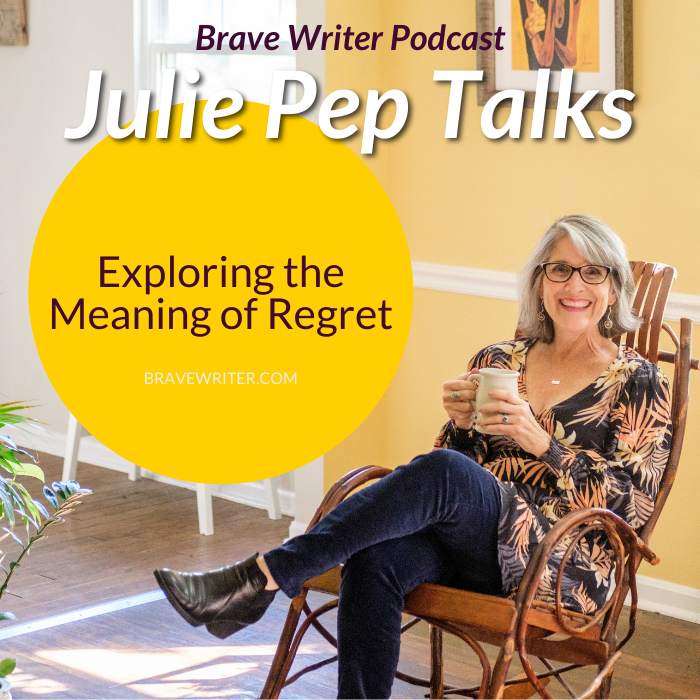Podcast: Exploring the Meaning of Regret

What do we do with regret?
On one hand, dwelling on our past – giving in to feelings of remorse, guilt, or shame – is not exactly productive. But on the other hand, regret is trying to tell you something, perhaps that you’ve been doing things wrong and could stand to make a change.
So what do we do with that feeling and how do we channel it productively? Let’s explore.
Show Notes
I received a question from one of our listeners. It went like this:
“I am reading a parenting book. On the one hand, it’s fantastic, totally shifting my paradigms. On the other, it’s cutting me to shreds by revealing how counterproductive or downright harmful my prior approach was.
So I’m struck with a potent mix of enthusiasm and commitment to the new idea and intense regret that I wasted 9 years on the old way.
I’m sure I’m not alone in this. Rationally, I KNOW we all make mistakes and damage our kids (that’s a #freakingtruth). But emotionally? I feel intense guilt and remorse. Shame for hurting my kids, shame for not knowing better. Bitterly wishing I could go back and tell my 25 year old self to get in therapy sooner! I know these feelings aren’t really productive, but ignoring them won’t help either. So what do I do with them?”
Let’s look at what you can do with regret in order to turn that unpleasant emotion into something productive and helpful.
What is regret?
We can often feel regret when we learn something we didn’t know before and now evaluate a past choice in light of this new information. Regret is the sensation that the previous choice failed and we should have known better at the time.
Ironically, I thought it was possible to side-step the regret pit. I thought if I was conscientious enough, I wouldn’t make the mistakes that people frequently regret. I believed that somehow I could curate a life free of regrets because I would be prepared, careful, and supported by right practices.
But the further we get into our journey of life, the more we realize this one truth. Life is hard. Adulting is hard. Marriage is hard. Parenting is hard. It often means learning on the job – and that means making mistakes. And mistakes often mean feeling regret.
Can regret be avoided?
It’s impossible to know in advance what you don’t know. We all roll the dice based on the latest and best data available to us. But that data is constantly changing as our understanding of the world changes. The impacts of alcoholism, codependency, and divorce on children were barely understood as I was making many of the decisions that would shape my future and those of my children.
Each era takes a slightly different approach to parenting, too. Certainly, each time a new parenting philosophy is promoted, we can be sure it is a counter-move against what didn’t work before. Whenever you had kids, you were influenced in countless invisible-to-you ways to adopt one or the other perspective.
The truth is: parenting will push you to the very edge of yourself and then a little beyond. You will consider methods you swore you’d never consider because of your exhaustion, exasperation, fear, and feelings of defeat. The moment you believe you have the right model, a child comes along to blow it up!
Regret, then, comes in a moment when you are no longer overwhelmed and at your wit’s end. It comes when you can reflect. But the moment you begin reflecting is no longer the moment where you made the choice that you now regret.
As I look back on my parenting experience, what I appreciate most about it now is that I kept pivoting. I was responsive to what I was seeing and experiencing, how my kids were responding and what they offered me. I didn’t do any of it perfectly, but I did learn, I did grow with them, I did repair when it was warranted, I did keep seeking more information to test and try.
Breaking free from regret
The regret loop is perfectionism in hindsight. It says you could have done it differently. But you didn’t.
To get out of the loop, we need to not only offer ourselves some grace but also go belly up with our kids. You don’t have to schedule a big appointment necessarily, but as you make changes in how you parent, you can acknowledge your new choices.
Belly up means admitting that you too are in a process and that your choices, as the adult, can do real harm. It matters to let the kids tell the full version of how they felt because the parents always keep a version of the event in their memory that favors them.
All we can offer is what we know now. But we can offer it with humility, love, and gentleness.
Some pain we’ve caused will require the child to rely on their own resources (spiritual, psychological, relational) to overcome pain you’ve caused. You can’t fix everything. That’s okay. Simply do better when you know better and welcome any grace or love they send your way.
To regret is human. It means you’re a good person. I’m so glad to be in a community of regreters. We’ll get there together. One day at a time.
Resources
- raisingcriticalthinkers.com
- Want help getting started with Brave Writer? Head over to bravewriter.com/getting-started
- Sign up for the Brave Writer newsletter to learn about all of the special offers we’re doing in 2022 and you’ll get a free seven-day Writing Blitz guide just for signing up: http://go.bravewriter.com/writing-blitz
Connect with Julie
- Instagram: instagram.com/juliebravewriter
- Twitter: twitter.com/bravewriter
- Facebook: facebook.com/bravewriter
Tags: Julie Pep Talks


















